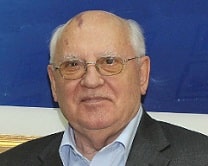Perestroika is a Russian word that can be translated as "reconstruction." That Russian term was formed by joining the prefix «pere-«, which means «again»; the verb "stroit", which is synonymous with "build", and the diminutive instrumental suffix "-ika".
Accepted by the Royal Spanish Academy ( RAE ), the term is used to refer to the opening process that took place in the Union of Soviet Socialist Republics ( USSR ) at the end of the 1980s .
 Perestroika was a reform that modified the economic and political structure of the USSR. The person responsible for its promotion was Mikhail Gorbachev , top leader of the Soviet Communist Party between 1985 and 1991 and head of State of the USSR from 1988 to 1991 .
Perestroika was a reform that modified the economic and political structure of the USSR. The person responsible for its promotion was Mikhail Gorbachev , top leader of the Soviet Communist Party between 1985 and 1991 and head of State of the USSR from 1988 to 1991 .
Gorbachev sought a new organization of the socialist regime with the aim of maintaining it. In this framework, he promoted democratic mechanisms in politics and initiated a shift towards a market economy.
With perestroika, the conclusion of individual employment contracts began to be allowed and private economic activities were authorized, for example. Furthermore, the State of the USSR divested itself of companies and created a new financial and banking system. Regarding political issues, this dimension of the process was known as glásnost ( "openness" ) and included greater freedoms and pluralism.
The plan, however, did not give the expected results. Perestroika caused an increase in inflation , multiplied poverty and paralyzed the economy . On the other hand, while the communists opposed perestroika as it moved away from socialism , the liberals considered the reform to be too slow.
Against this background, in 1990 the state sovereignty of the Russian Soviet Federative Socialist Republic was declared and then other members of the union proclaimed their independence. Finally, on December 8, 1991, the treaty of dissolution of the USSR was signed and the Commonwealth of Independent States ( CIS ) was born.
Other important curiosities about perestroika were the following:
-Gorbachev launched it just a month after he came to power. Specifically, the beginning of it took place on April 23, 1985. And he did so as a way to be able to face the serious development crisis that his land was suffering.
-Among the great tools that this process used were both freedom of expression and information transparency.
-It is considered that perestroika changed the destiny of the history of Russia, but also of the entire world.
-Within this process promoted by Gorbachev, unique campaigns were carried out. Specifically, we are referring to the one that fought against work absenteeism and the one that tried to drastically reduce alcohol consumption by the population.
-Currently, some of the transformations and changes introduced by this opening process imposed by the aforementioned political figure continue to be maintained. We are referring, specifically, to civil liberties, political pluralism and also the so-called market economy .
-Surveys that have been carried out to find out what opinion Russian citizens have of perestroika have made it clear that 65% of them believe that it was disastrous and a serious mistake.
